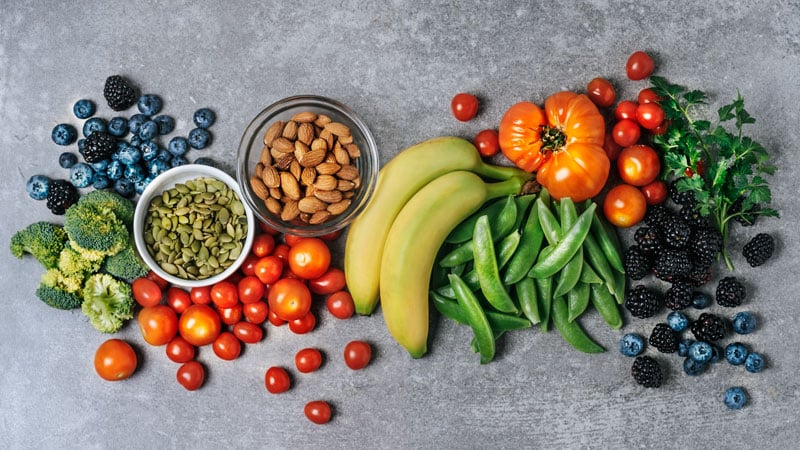Plant-Based Diets Associated with Lower Prostate Cancer Progression Risk
Core Concepts
A predominantly plant-based diet is associated with a lower risk of prostate cancer progression in men after diagnosis and treatment.
Abstract
This study examined the relationship between plant-based diets and the progression of prostate cancer in over 2,000 men. The researchers used two dietary indices - the Plant-based Diet Index (PDI) and the healthful PDI (hPDI) - to assess the proportion of plant-based foods in the participants' diets.
The key findings are:
- Men who consumed the most plant-based diets according to the PDI had a 47% lower risk of disease progression compared to those in the lowest PDI quintile.
- For men with aggressive prostate cancer (Gleason score ≥ 7), those in the highest hPDI quintile had a 55% lower risk of progression compared to the lowest hPDI quintile.
- The study did not examine vegan or vegetarian diets specifically, as even the highest PDI quintile participants consumed some meat and dairy products.
- The researchers concluded that a predominantly plant-based diet in men with prostate cancer may be associated with better prostate cancer-specific outcomes, and dietary assessment and counseling could be beneficial.
Customize Summary
Rewrite with AI
Generate Citations
Translate Source
To Another Language
Generate MindMap
from source content
Visit Source
www.medscape.com
Does Diet Affect Progression Risk After Prostate Cancer?
Stats
Men in the highest PDI quintile had a 47% lower risk of disease progression compared to the lowest PDI quintile.
For men with aggressive prostate cancer (Gleason score ≥ 7), those in the highest hPDI quintile had a 55% lower risk of progression compared to the lowest hPDI quintile.
The study followed 2,062 participants for a median of 6.5 years after they completed the food frequency questionnaire.
During the follow-up period, there were 190 cases of prostate cancer progression and 61 prostate cancer-specific deaths.
Quotes
"What makes this relatively high-profile published study interesting is that it examined whether diet is relevant for the recurrence of prostate cancer in over 2000 men with 6.5 years of follow-up after diagnosis."
"It may be beneficial to assess the diet of prostate cancer patients and offer nutritional counseling as needed to establish healthy eating habits and support well-being and overall health."
Key Insights Distilled From
by Nadine Ecker... at www.medscape.com 05-31-2024
https://www.medscape.com/viewarticle/does-diet-affect-progression-risk-after-prostate-cancer-2024a1000a89
Deeper Inquiries
What specific plant-based foods or dietary patterns were most strongly associated with reduced prostate cancer progression risk?
The study found that plant-based diets rich in whole grains, vegetables, nuts, and legumes were most strongly associated with a reduced risk of prostate cancer progression. These foods are considered healthy and were reflected in the healthful Plant-based Diet Index (hPDI). The hPDI took into account the quality of plant-based foods consumed, distinguishing between healthy and unhealthy options. Specifically, consuming whole grains, vegetables, nuts, and legumes was linked to a lower risk of disease progression in men with prostate cancer.
How might the findings of this study be used to inform dietary recommendations for prostate cancer patients, given that the study did not examine vegan or vegetarian diets specifically?
Although the study did not specifically focus on vegan or vegetarian diets, the findings suggest that incorporating more plant-based foods into the diet of prostate cancer patients could be beneficial for reducing disease progression. Healthcare providers could use these findings to recommend a diet rich in plant-based foods such as whole grains, vegetables, nuts, and legumes to their patients. While the study did not advocate for complete avoidance of animal products, it emphasized the importance of a predominantly plant-based diet for better prostate cancer-specific outcomes. Therefore, healthcare professionals could advise patients to adopt a Mediterranean-style diet that includes plenty of vegetables and fruits, healthy fats like olive oil, fish, and limited red meat consumption.
What other lifestyle factors, in addition to diet, could potentially influence prostate cancer progression, and how could they be incorporated into a comprehensive approach to supporting prostate cancer patients?
In addition to diet, several other lifestyle factors could influence prostate cancer progression. These factors may include regular physical activity, maintaining a healthy weight, managing stress levels, avoiding tobacco use, and limiting alcohol consumption. Healthcare providers could incorporate these factors into a comprehensive approach to supporting prostate cancer patients by offering holistic care that addresses not only dietary habits but also exercise routines, stress management techniques, smoking cessation support, and guidance on alcohol intake. By promoting a healthy lifestyle that encompasses various aspects beyond diet, healthcare professionals can help prostate cancer patients improve their overall well-being and potentially reduce the risk of disease progression.
0
